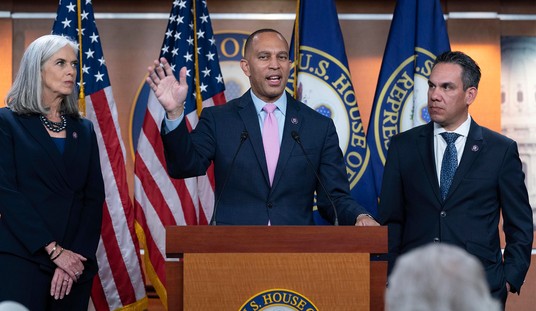Later this afternoon, the House will vote on Representative Denny Rehberg’s (R-MT) amendment to the Continuing Resolution (CR) to defund elements of ObamaCare. Representative Steve King (R-IA) took a run at attaching legislation to fully defund ObamaCare to the CR earlier this week, but was beaten back by the rules of the House. King lost a vote to waive the House rule forbidding legislation on an appropriations bill. Conservatives are saddened that the King effort failed.
The Rehberg Amendment would defund the discretionary elements of ObamaCare for the remainder of the fiscal year.
The Rehberg Amendment would do the following according to the House Republican Study Committee:
This amendment would insert a new section at the end of the bill providing that none of the funds made available by this Act under the Title appropriating funds for Labor, Health and Human Services, and Education may be paid to any employee, officer, contractor, or grantee of any department or agency to implement any provisions of ObamaCare.
If this amendment passes, it will be interesting to see if it survives in the Senate. The Senate is expected to commence a debate on the CR the first week of March in anticipation of the March 4th deadline. On March 4th the federal government runs out of money and they will have to either pass the House CR or another short term CR to keep the government from running out of money the first Friday in March.
It is going to be fascinating to see if President Obama issues a specific veto threat with regard to the Rehberg effort to defund elements of ObamaCare, if the amendment passes the House later today. The President has already issued a veto threat and has pledged not to sign the House drafted version of the CR, H.R. 1. It is clear that this is an effort to strengthen the negotiating hand of the Senate on the details of the final version of a CR.
The Wall Street Journal reported that House Republicans are fighting to curb some the discretionary funding for ObamaCare through the end of his fiscal year that ends on September 30, 2011.
House Republicans pushed Friday to derail the Obama administration’s health-care overhaul, preparing to bar the federal government from spending money on the plan. Rep. Denny Rehberg (R., Mont.) put the ban in an amendment to a budget bill funding the federal government through the remaining months of fiscal 2011. “We wanted to create jobs. You wasted time on the health-care reform,” Mr. Rehberg said on the House floor, addressing Democrats. A vote on the amendment by the Republican-led House was expected later Friday.
The Washington Post has a pretty good description of the current state of play on ObamaCare repeal efforts.
Every Republican in the House and Senate has already voted to repeal the health care law, but the effort at overturning the entire law stalled earlier this month in the Democratic-controlled upper chamber. The fate of the health-care overhaul is expected to be ultimately decided by the Supreme Court. In the meantime, lawmakers have set forth looking for ways to dismantle it. This week’s measure funding the federal government through September has provided the House Republicans with their first opportunity to attempt to directly block funding.
Ernest Istook, Fellow at The Heritage Foundation (my employer), wrote this week about the big problem defunding ObamaCare. The liberals gamed the legislation to take much of the funding offline in the form of long term appropriations language, so that the House and Senate appropriators would not have discretion on future funding for the President’s health care program.
But here’s the dirty little secret: Much of Obamacare is being implemented with money that was already appropriated last year. These billions are already available for bureaucrats to put Obamacare into force. Denying additional funding for Obamacare does not defund the huge amounts it already is using for implementation. That requires additional action. Even though the last Congress failed to pass other appropriations bills (creating the need for the currently-pending spending measure), that former Congress DID provide billions to get Obamacare launched. The money was directly appropriated as part of the health care legislation, rather than included in a separate appropriations bill as is the normal practice. The details are in a Congressional Research Service report issued last October, “Appropriations and Fund Transfers in the Patient Protection and Affordable Care Act (PPACA).” CRS devotes seven pages to describing the billions of dollars already appropriated and which the Obama Administration even now is spending to promote that law.
Defunding ObamaCare is very difficult, but the Rehberg Amendment will defund elements that were not covered by the long term appropriations contained in the health care law.
Istook concludes in his piece, “The Dirty Little Secret About De-Funing ObamaCare” the following:
Conservatives agree with the American people that Obamacare should be repealed. Short of outright repeal, leaders from 32 conservative groups in the Conservative Action Project have unitedly stated that the next-best strategy is defunding. As their report states, “The safest route for legislatively combating Obamacare is to defund it. Now that the statute has been declared unconstitutional, Congress should use the power of the purse to deny funding for the individual mandate, employer mandates, and writing the 100s of regulations need to impose Obamacare. Such legislation will not in any way jeopardize the ongoing litigation efforts.” It’s good that a federal judge has declared Obamacare unconstitutional, but the White House insists it’s going forward anyway. It’s good that the House may cut off any new money to implement Obamacare. But unless Congress deals with the pot of money already provided, we won’t meet the goal of defunding Obamacare.
The Rehberg Amendment is phase one and the first skirmish in the effort to chip away, with the ultimate goal of full repeal, of ObamaCare. The way this debate plays out today in the House will be instructive. It will be interesting to see how House liberals handle this vote. It will also be very interesting to see how the Senate handles this, assuming the Rehberg Amendment passes, and how the President messages on the language contained in the Rehberg Amendment. Expect to hear much more about this issue in the upcoming two weeks.













Join the conversation as a VIP Member